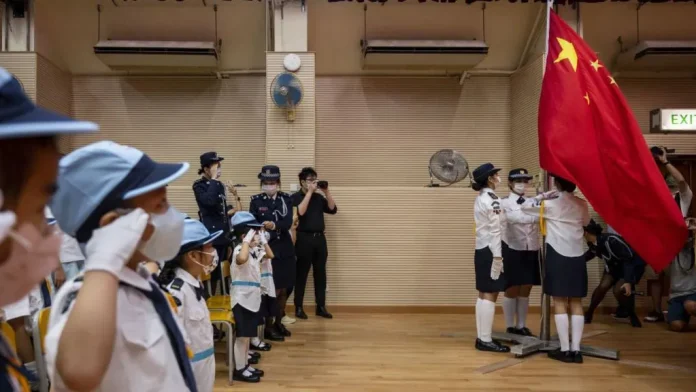Hong Kong officials have recently spotlighted two schools for what they deemed as singing the Chinese national anthem “too softly. teachers at a third school were instructed to aid students in developing a stronger habit and confidence when singing the anthem. This initiative comes as part of Hong Kong’s intensified focus on “patriotic” education, which gained momentum following China’s crackdown on the city’s pro-democracy movement in 2020.
Officials criticized the vocal performance of students at Hong Kong and Macau Lutheran Church Primary School, describing their rendition as “soft and weak” and urging for improvements. At Yan Chai Hospital Lim Por Yen Secondary School, teachers were directed to ensure that students sing the anthem loudly and in unison, aiming to foster a more robust patriotic spirit.
These assessments and directives were outlined in reports released by Hong Kong’s education bureau, following inspections of numerous primary and secondary schools, as well as consultations with school staff and parents. Out of the 20 schools whose inspection reports were made public, at least six were advised to bolster their educational programs centered around patriotism.
Some schools received commendations for their initiatives, such as organizing trips for students to mainland China, where they exhibited confidence in raising the national flag. These activities align with Hong Kong’s broader educational reforms, particularly since January, when a new law mandated patriotic education in school curricula and extended its reach to corporate operations.
The law’s purpose, as articulated by Beijing, is to promote ideological unity and fortify the foundations for a resilient nation. Critics, however, view these measures as further encroachments on Hong Kong’s autonomy.
The implementation of Hong Kong’s national security law in 2020, which criminalized dissent under the pretext of maintaining stability, many former opposition lawmakers and democracy activists have been imprisoned. Despite international criticism, Beijing defends the law as crucial for safeguarding stability and national security.
The concept of patriotism has increasingly become synonymous with Beijing’s tightening grip on Hong Kong. This shift includes a revamp of the city’s electoral system, with the introduction of a “patriots’ law” that disqualifies individuals deemed insufficiently patriotic from holding public office. More recently, authorities banned “Glory to Hong Kong,” a popular protest anthem, citing its potential to incite sedition.
Hong Kong’s government has also established committees aimed at promoting Chinese cultural appreciation and historical understanding among the younger generation. Chief Executive John Lee emphasized the importance of instilling these values, echoing the education bureau’s efforts to integrate patriotic education into school curricula.
The education bureau introduced a new subject requiring students as young as eight to study the Beijing-enacted security law. This curriculum also encompasses teachings on Chinese culture and history aligned with the vision of the Chinese Communist Party (CCP).Circular published by the bureau underscored the objective for students to recognize Hong Kong’s ties to the mainland and its global connectivity, fostering a sense of cultural pride and confidence.
The bureau called upon parents to collaborate with schools in imparting the significance of national security, as well as enhancing their children’s national identity and pride. These initiatives reflect ongoing efforts to align Hong Kong’s educational framework with Beijing’s directives, reinforcing the integration of patriotic education into every aspect of the city’s educational system.
Hong Kong’s educational policies and practices are increasingly shaped by Beijing’s directives, emphasizing patriotic education as a cornerstone for fostering national unity and stability. These measures, however, continue to draw criticism for their perceived erosion of Hong Kong’s autonomy and civil liberties.























